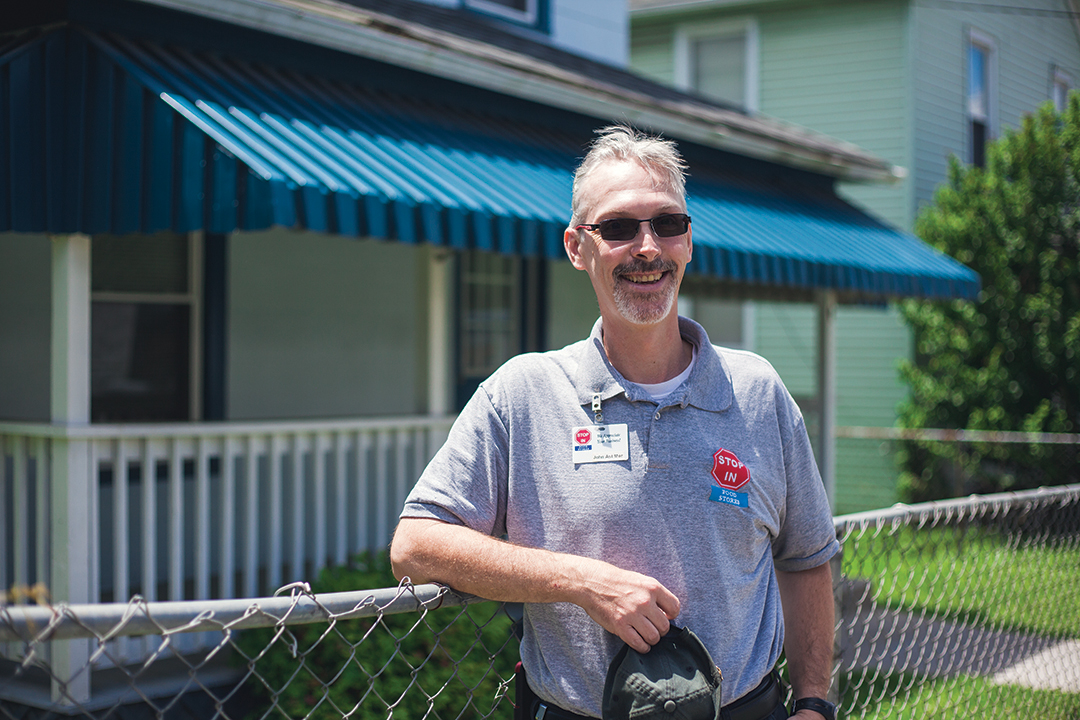Starting Over and Thriving: John, Virginia CARES client
It was getting late on an August Friday in 2011, in Covington, Virginia. All John LaFlamme had in the world were the clothes on his back and a copy of his high school diploma. He had no car, no home, no family in the area, and no ID. He had just been released from prison.
Time was not on John’s side.
Within a few short months he would either successfully become a stable member of the community or he would fail to meet his parole requirements and end up back in prison.
Leslie Matney, who was at the time the district’s chief of probation and parole, recalled that the first afternoon, the scope of the tasks that John needed to accomplish in a short amount of time was daunting.
The challenges extended as far into John’s future as she could see. “He owed thousands of dollars in court costs,” Leslie pointed out. “He was stuck in the Catch-22 of not being able to afford a permanent address without a job and not being able to get a job without being able to list a full-time address,” she said.
Finding work was another challenge
The Great Recession made getting a job extremely difficult. When John got out, it seemed no one was hiring. However, despite the employment opportunities in Covington being more limited than perhaps might have been the case in a larger city, there were also opportunities in Covington that would prove crucial to John’s success story. Many returning citizens like John exit prison without a support network. For them, the sink-or-swim nature of release makes the challenge to find the right tools critical.
Luckily, John Found Help
To connect returning citizens to the services and resources that already exist, Virginia created local Reentry and Community Collaboration Councils. The councils brought together state, local, private, and community-based organizations to make better use of existing resources. Ultimately, they help returning citizens build their skills, practice good habits, and keep their positive momentum to improve their chances of gaining good jobs and remaining out of prison permanently.
Upon his release at 4:00 p.m. on a Friday, within an hour, John had obtained a temporary place to stay at a motel and met up with TAP Virginia CARES’ Lawrence St. Clair. The two talked about the obstacles facing John and began to connect. John began to work with our Virginia CARES staff regularly and attended the computer classes and the Thinking for a Change program there. He volunteered. He used all the tools that CARES offered to turn his hard work into tangible results.
Slowly, John gained momentum. Through his volunteering in the community, he made a connection with Debbie Barber of Motor-Vation Lawn Care, who hired him part-time and taught him landscaping. With a work history and references on his applications, John eventually found full-time employment with benefits. He went from staying in a motel to renting a small garage apartment, which he renovated, to owning the house in front of the garage apartment.
Thriving Today
Today, he is active in the faith community and serves as a board member for Virginia CARES, Inc.—where he continues to work alongside former Chief of Probation and Parole Leslie Matney. Reflecting on John’s progress and his role on the CARES board of directors, Leslie summarized the value of John’s progress as a source of experience and encouragement for the whole organization: “To have John’s perspective, to have that voice on our board is so valuable.”
When asked about the key to his success, John’s answer is almost a perfect mirror image of Leslie’s. Her career in probation and parole and its lessons of building a community of support for returning citizens have led her to conclude that “it takes a village” to help formerly institutionalized people. John, meanwhile, reflected on his story and what he most often shares with those he mentors now: “Nobody can do it by themselves.”
Click here to find out more about our Virginia CARES program.

